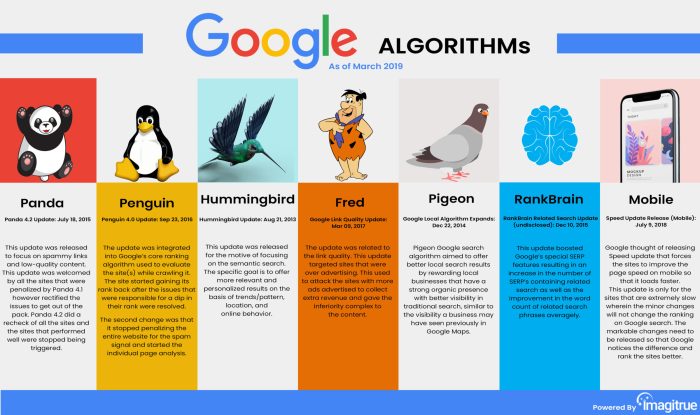Understanding SEO Algorithms – Understanding Algorithms sets the stage for unraveling the mysterious world of search engine optimization. Get ready to dive into a rollercoaster ride of insights and strategies that will revolutionize your digital presence.
From the impact of algorithms on search engine rankings to adapting to constant changes, this journey will equip you with the knowledge needed to conquer the game.
Overview of Algorithms: Understanding SEO Algorithms
In the world of search engine optimization (), algorithms play a crucial role in determining how websites are ranked in search engine results pages (SERPs). These algorithms are complex sets of rules and calculations used by search engines to determine which websites are most relevant to a user’s search query.
Role of Algorithms in
Algorithms in are designed to analyze various factors on a website to determine its relevance and authority in relation to a user’s search query. These factors can include s, backlinks, content quality, user experience, and many others. By understanding how these algorithms work, website owners and marketers can optimize their sites to increase visibility and organic traffic.
Impact on Search Engine Rankings
algorithms directly impact where a website appears in search results. Websites that adhere to best practices and provide valuable, relevant content are more likely to rank higher in SERPs. Understanding these algorithms allows website owners to make informed decisions about their strategies and improve their chances of ranking well.
Importance of Understanding Algorithms
Understanding algorithms is essential for website optimization. By knowing how search engines evaluate and rank websites, marketers can tailor their efforts to meet these criteria effectively. This knowledge can lead to improved search rankings, increased organic traffic, and ultimately, better online visibility and success.
Types of Algorithms

algorithms play a crucial role in determining a website’s ranking on search engine results pages. Here are some of the most prominent types of algorithms and how they impact strategies:
Google Panda
Google Panda is designed to penalize websites with low-quality content. It focuses on evaluating the quality of a website’s content, including factors like relevance, uniqueness, and user engagement. Websites with duplicate, thin, or irrelevant content are likely to be downgraded in the search results by Google Panda.
Google Penguin
Google Penguin algorithm targets websites that engage in manipulative link building practices to improve their search rankings. It penalizes websites with unnatural or spammy backlinks, as well as those involved in link schemes. Websites that violate Google’s guidelines regarding link building are at risk of being penalized by Google Penguin.
RankBrain, Understanding SEO Algorithms
RankBrain is a machine learning algorithm used by Google to process search queries and deliver more relevant search results. It focuses on understanding the context and intent behind search queries to provide users with the most relevant and useful results. RankBrain uses artificial intelligence to interpret search queries and improve the overall search experience for users.
These algorithms have a significant impact on strategies, as website owners need to ensure their content is high-quality, relevant, and engaging to avoid being penalized by algorithms like Google Panda and Google Penguin. Understanding how each algorithm works can help website owners optimize their sites for better search engine rankings.
Factors Influencing Algorithms

The key factors that influence algorithms include content quality, backlinks, and user experience. These elements play a crucial role in determining the ranking of a website in search engine results.
Content Quality
High-quality content is essential for algorithm ranking. Search engines prioritize websites that provide valuable, relevant, and engaging content to users. Content should be well-written, informative, and optimized with relevant s to improve visibility and ranking.
Backlinks
Backlinks are links from other websites that point to your site. They serve as a vote of confidence and credibility for your content. The more high-quality backlinks your website has, the more authority it gains in the eyes of search engines. Backlinks are an important factor in determining the ranking of a website in search results.
User Experience
User experience plays a significant role in algorithm decisions. Search engines prioritize websites that offer a positive user experience, including fast loading times, easy navigation, and mobile responsiveness. Websites that provide a seamless and enjoyable experience for users are more likely to rank higher in search results.
Adapting to Algorithm Changes
In the ever-evolving world of , staying ahead of algorithm changes is crucial for maintaining search visibility and rankings. Here are some strategies to help you adapt to frequent updates and ensure success.
Stay Informed and Educated
- Follow reputable news sources and blogs to stay updated on the latest algorithm changes.
- Attend webinars, conferences, and workshops to deepen your understanding of algorithms and updates.
- Engage with communities and forums to discuss and share insights on algorithm changes.
Monitor Performance Metrics
- Regularly monitor key performance indicators (KPIs) such as organic traffic, rankings, and conversion rates to identify any negative impacts of algorithm updates.
- Use tools like Google Analytics, Google Search Console, and monitoring platforms to track changes in website performance.
- Adjust your strategy based on performance data to align with the latest algorithm requirements.
Adapt and Experiment
- Be flexible and willing to adapt your tactics to meet the changing algorithm criteria.
- Experiment with new strategies and techniques to see how they impact your website’s performance post-algorithm update.
- Continuously test and optimize your approach to stay ahead of the curve and maintain visibility in search results.





